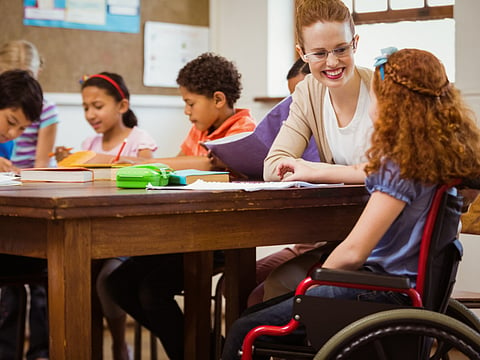Special needs children should be treated equally
We need to stop with the small excuses in the face of our collective responsibility towards achieving an inclusive society

The drive to accept people with special needs has gained more momentum in the past few decades, and it is high time that we, as a civilised society, accept them in every possible way. Inclusive education is a right that every person living in a civilised society should be able to have.
There is tremendous resistance to it no doubt, maybe because ‘inclusion’ seems to be a painstaking change. For the teachers it means further differentiated lesson plans and for the school authorities it means more manpower and consequently more expenditure and policy reforms. And the list goes on.
However, these are all very small excuses in the face of our collective responsibility towards achieving an inclusive society. What better way of beginning it other than starting from the educational setup. We live in a civilised society where we acknowledge that every individual has the right to access the basic facilities that society provides and education is a primary facility.
Policies to change, may take time, but attitude can be and should be changed.
My role as a special needs educator in a mainstream school is to ensure that the rights of the special needs students in the school are protected. I had read once that policies and attitude can sometimes act as the strongest of forces against change. Today, I believe every word of it.
This leads me to think that the resistance to this movement is much stronger than the one that was displayed against women’s education many decades ago.
When these students can very well be catered to in the mainstream schools with just a bit planning, policy reforms and lesson differentiation and, of course, a lot of tolerance in the teaching community, then I believe that they should be accommodated.
Amidst so much resistance, there does exist several mainstream schools where people are extremely passionate about children with special needs and they go to any extent to protect their rights. I feel blessed to be a part of one.
Nothing will remain impossible for these differently abled students to achieve if we, the teaching community and the community as a whole are empathetic, supportive, assertive and human enough to recognise and celebrate the differences of special needs and make it their priority.
I have good faith that there still exist a few educators who work not for any award or reward, but for upholding the nobility and humbleness of the profession as it was many years ago - when education had not yet transformed into a business sector.
The need is for the policy makers to be more flexible and accommodate children with difficulties, the parents to be more patient, the teachers to be more empathetic and accepting.
- The reader is a special needs educator in a mainstream school in Sharjah.


